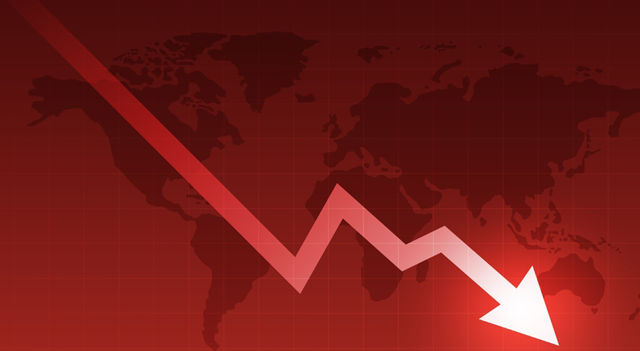Stocks plummeted during trading on Thursday amid concerns about a global trade war following President Donald Trump’s tariff announcement. The sell-off dragged the Nasdaq and the S&P 500 down to their lowest levels since last August, while the Dow slumped to a nearly seven-month closing low.
The major averages saw further downside going into the close, ending the session near their worst levels of the day. The Nasdaq plummeted 1,050.44 points or 6.0 percent to 16,550.61, the S&P 500 (SPI:SP500) plunged 274.45 points or 4.8 percent to 5,396.52 and the Dow tumbled 1,696.39 points or 4.0 percent to 40,545.93.
The nosedive on Wall Street came after Trump delivered a highly anticipated speech on Wednesday outlining his plan to impose sweeping tariffs on U.S. trade partners.
Trump’s “reciprocal tariff” plan calls for a baseline 10 percent tariff to be imposed on all U.S. imports except those compliant with the United States-Mexico-Canada Agreement.
Certain countries deemed the “worst offenders” will face much higher tariffs, with countries like Cambodia, Laos, Madagascar and Vietnam set to be charged nearly 50 percent.
China, which will face a 54 percent tariff rate when the new levies are combined with existing duties, has vowed to take countermeasures.
Canada and the European Union are also preparing countermeasures, leading to concerns about a trade war that could fuel inflation and damage the global economy.
“The roller coaster ride continues as the initial leaks were positive (only 10% baseline tariffs), but then the details were released and they were far worse than expected (24-49% outside of the EU and UK),” said Chris Zaccarelli, Chief Investment Officer for Northlight Asset Management.
He added, “The silver lining for investors could be that this is only a starting point for negotiations with other countries and ultimately tariff rates will come down across the board – but for now traders are shooting first and asking questions later.”
Possibly adding to the negative sentiment, the Institute for Supply Management released a report showing U.S. service sector growth slowed by more than anticipated in the month of March.
The ISM said its services PMI fell to 50.8 in March after inching up to 53.5 in February. While a reading above 50 still indicates growth, economists had expected the index to show a more modest decrease to 53.0.
Sector News
Computer hardware stocks turned in some of the market’s worst performances on the day, with the NYSE Arca Computer Hardware Index plummeting by 13.6 percent to its lowest closing level in over a year.
Substantial weakness was also visible among semiconductor stocks, as reflected by the 9.9 percent nosedive by the Philadelphia Semiconductor Index. The index also plunged to a one-year closing low.
Banking stocks also showed a significant move to the downside, dragging the KBW Bank Index down by 9.9 percent to its lowest intraday level in almost seven months.
Networking, oil producer and transportation stocks also saw considerable weakness amid a broad based sell-off on Wall Street.
Other Markets
In overseas trading, stock markets across the Asia-Pacific region moved mostly lower during trading on Thursday. Japan’s Nikkei 225 Index plunged by 2.8 percent, while Hong Kong’s Hang Seng Index slumped by 1.5 percent.
The major European markets also showed significant moves to the downside on the day. While the French CAC 40 Index plummeted by 3.3 percent, the German DAX Index dove by 3.0 percent and the U.K.’s FTSE 100 Index tumbled by 1.6 percent.
In the bond market, treasuries skyrocketed in reaction to Trump’s tariff announcement. Subsequently, the yield on the benchmark ten-year note, which moves opposite of its price, plunged 14.1 basis points to a five-month closing low of 4.055 percent.
Looking Ahead
The Labor Department’s closely watched monthly jobs report is likely to be in focus on Friday, while traders are also likely to keep an eye on remarks by Federal Reserve Chair Jerome Powell.
SOURCE: RTTNEWS
